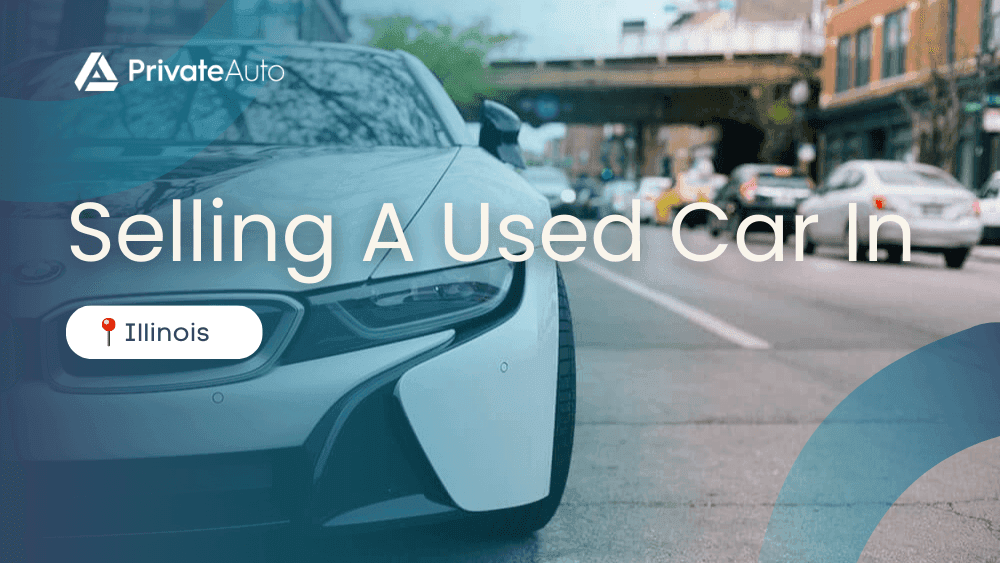Selling a Used Car in Illinois
PrivateAuto is the fastest, most secure, and most convenient platform for selling your used car in Illinois. We tell you everything you need to know.
Get started by entering your vehicle's plate or VIN
License plate
VIN
Every state has its own requirements for private parties who want to sell their old car. If you're wondering how to sell your car In Illinois, the process isn't all that complicated. In fact, with just a handful of steps (some of which are standard across the nation), you can get cash-in-hand for your old car in no time at all.
1. Know Your Car's Value
The first step to sell your car privately is to understand its reasonable market value. You can attain this information with a tool like Kelley Blue Book. In addition to describing your specific year, make, and model, you can list any added features your car has, select its color, and add its mileage information.
Kelley Blue Book will show you a range of prices, depending on if you're thinking about trading it in at a dealer (which will always leave you with less profit) or if you're selling it as a private party. One thing you'll need to objectively consider is your car's condition, as Kelley Blue Book will show you various price ranges according to the car's condition.
Kelley Blue Book will show you a range of prices, depending on if you're thinking about trading it in at a dealer (which will always leave you with less profit) or if you're selling it as a private party. One thing you'll need to objectively consider is your car's condition, as Kelley Blue Book will show you various price ranges according to the car's condition.
2. Prepare Your Vehicle's Listing
Once you know your car's fair market value for the area and you've decided to proceed with the sale, the next step is to prepare your vehicle's listing. You might consider posting on a local bulletin board, if they're well-used in your area, or putting a "for sale" sign in your car's window. Of course, your best bet for maximum exposure and the quickest sale is to list your car online.
Aside from your local Craigslist section or Facebook Groups, you should also consider a specialty platform like PrivateAuto. When you sell your car privately through PrivateAuto, you get to save time with perks like a test drive scheduler, ready-to-sign state documents, and electronic signatures. With PrivateAuto, you can sell your car locally or nationally with ease.
As you prepare your listings, be sure you clean up your car, take nice photos, and describe its best features in detail. Get into the buyer's shoes and consider what matters to them, be it gas mileage, comfortable seating for a large family, or towing capacity.
Aside from your local Craigslist section or Facebook Groups, you should also consider a specialty platform like PrivateAuto. When you sell your car privately through PrivateAuto, you get to save time with perks like a test drive scheduler, ready-to-sign state documents, and electronic signatures. With PrivateAuto, you can sell your car locally or nationally with ease.
As you prepare your listings, be sure you clean up your car, take nice photos, and describe its best features in detail. Get into the buyer's shoes and consider what matters to them, be it gas mileage, comfortable seating for a large family, or towing capacity.
3. Be Responsive to Interested Shoppers
After your listings go live, it's essential that you respond to anyone who contacts you about your car. If you're repeatedly getting asked the same questions, you should consider adding that information right into the listing to save you time (i.e., tire condition, aftermarket stereo model, etc.). It's a given that people will want to see the car before they negotiate, so make sure you are as available as possible for showings and test drives.
When it does come time to negotiate, make sure you have your bottom dollar set well in advance. If you want to sell your car as quickly as possible, you'll likely have to settle for a little less than market value. In fact, if you have a car that simply isn't in high demand for your area (like a convertible in a snowy town), you may very well have to take a little less than market value anyway.
What's most important is that you get ahead of the negotiation process, understand your timeline for selling, and come up with a bottom dollar that you think is fair based on how urgently you want cash in hand and what your local market expects.
When it does come time to negotiate, make sure you have your bottom dollar set well in advance. If you want to sell your car as quickly as possible, you'll likely have to settle for a little less than market value. In fact, if you have a car that simply isn't in high demand for your area (like a convertible in a snowy town), you may very well have to take a little less than market value anyway.
What's most important is that you get ahead of the negotiation process, understand your timeline for selling, and come up with a bottom dollar that you think is fair based on how urgently you want cash in hand and what your local market expects.
4. Understand Illinois' Requirements
Has an interested buyer come along? If so, it's time to understand Illinois' requirements to make sure you're following all state laws throughout the car sale.
If you have any questions about selling your car in Illinois, you can always contact the Secretary of State or visit their website for additional resources.
•
Prepare a Bill of Sale: Your buyer will need a Bill of Sale to help them register the car in their name. Prepare one for them by gathering their name and address. Fill in the price they're paying for the car and the mileage, too. You should keep a copy of the Bill of Sale for your own records.
•
Complete the Notice of Sale: Remove the Notice of Sale form from the bottom of your car's title and complete it accordingly. Mail it into the address listed, which is the Secretary of State's office. If your title doesn't have a Notice of Sale attached, you can download one.
•
Keep your license plate: In Illinois, your license plates belong to the registered owner (i.e., you) and they do not stay with the car when you sell it. You can either turn the plates in or transfer them to your next vehicle.
•
Hand over the vehicle's title: When the buyer comes to get your vehicle, you'll need to hand them the car's title. If you do not have the car's title in hand, follow the steps to replace a lost title or understand what you need to do to payoff your car in order to receive the title and transfer ownership.
•
Remove your registration and insurance: Go through the glove box one last time to make sure the vehicle's registration and insurance cards are removed. Once your buyer has the keys in hand, you need to contact your insurance company and remove the vehicle from your insurance policy. It is now the buyer's responsibility to ensure the car is insured.
Sell Your Car Faster with PrivateAuto
As you can see, Illinois doesn't ask for too much when you decide to sell your car privately. In fact, the most time-consuming process is figuring out where to list your car and actually getting a buyer to bite on the listing. Here at PrivateAuto, we try to make that process as streamlined as possible.
As a national website for private party auto sales, PrivateAuto will give your listing as much exposure as possible while helping make paperwork and communication as secure, seamless, and stress-free as possible. Ready to get started? List your car today.
As a national website for private party auto sales, PrivateAuto will give your listing as much exposure as possible while helping make paperwork and communication as secure, seamless, and stress-free as possible. Ready to get started? List your car today.
Why a Illinois Private Car Sale is Better
You can typically get a higher price for your car in the private market than they do from a Illinois dealership trade-in. That’s because dealerships need to make a spread: they buy low and sell high.
Unfortunately, selling your vehicle on the private market has always been a cumbersome process, in Illinois and throughout the US. Until now.
Unfortunately, selling your vehicle on the private market has always been a cumbersome process, in Illinois and throughout the US. Until now.
How PrivateAuto Helps You Sell Your Car in Illinois
Illinois private car sellers love PrivateAuto because we make the process of selling your car so simple.
•
Full banking integration for instant money transfers, 24/7/365
•
Verified buyer funds presale so you don’t waste your time
•
Makes selling a vehicle (and getting paid) quick, easy, and secure
Selling your Car on PrivateAuto: the Process
Here’s how the PrivateAuto selling process works:
1. You register on PrivateAuto and we verify you
2. You list your car model with our easy step-by-step guided process
3. You set your terms and screen would-be buyers
4. You vet incoming offers and choose a buyer
5. You and the buyer e-sign documents from your PrivateAuto phone app
6. You get paid, instantaneously
So easy.
Are you interested in buying a car in Illinois instead? Look through our used cars for sale.
1. You register on PrivateAuto and we verify you
2. You list your car model with our easy step-by-step guided process
3. You set your terms and screen would-be buyers
4. You vet incoming offers and choose a buyer
5. You and the buyer e-sign documents from your PrivateAuto phone app
6. You get paid, instantaneously
So easy.
Are you interested in buying a car in Illinois instead? Look through our used cars for sale.
Selling a Car in Illinois FAQ
What paperwork do I need to sell my car privately in Illinois?
Every state has its own documentation requirements for selling a used car. Luckily for you, PrivateAuto helps you keep track of all needed paperwork requirements with our step-by-step in-app process.
You will need the following paperwork to sell your car in Illinois:
- Warranty documents
- Service documents
- Bill of sale
- Car title and registration documents
- Vehicle identification number
- Car insurance documents
PrivateAuto guides you through the selling process, so you never risk forgetting about a document you need to make the sale.
You will need the following paperwork to sell your car in Illinois:
- Warranty documents
- Service documents
- Bill of sale
- Car title and registration documents
- Vehicle identification number
- Car insurance documents
PrivateAuto guides you through the selling process, so you never risk forgetting about a document you need to make the sale.


